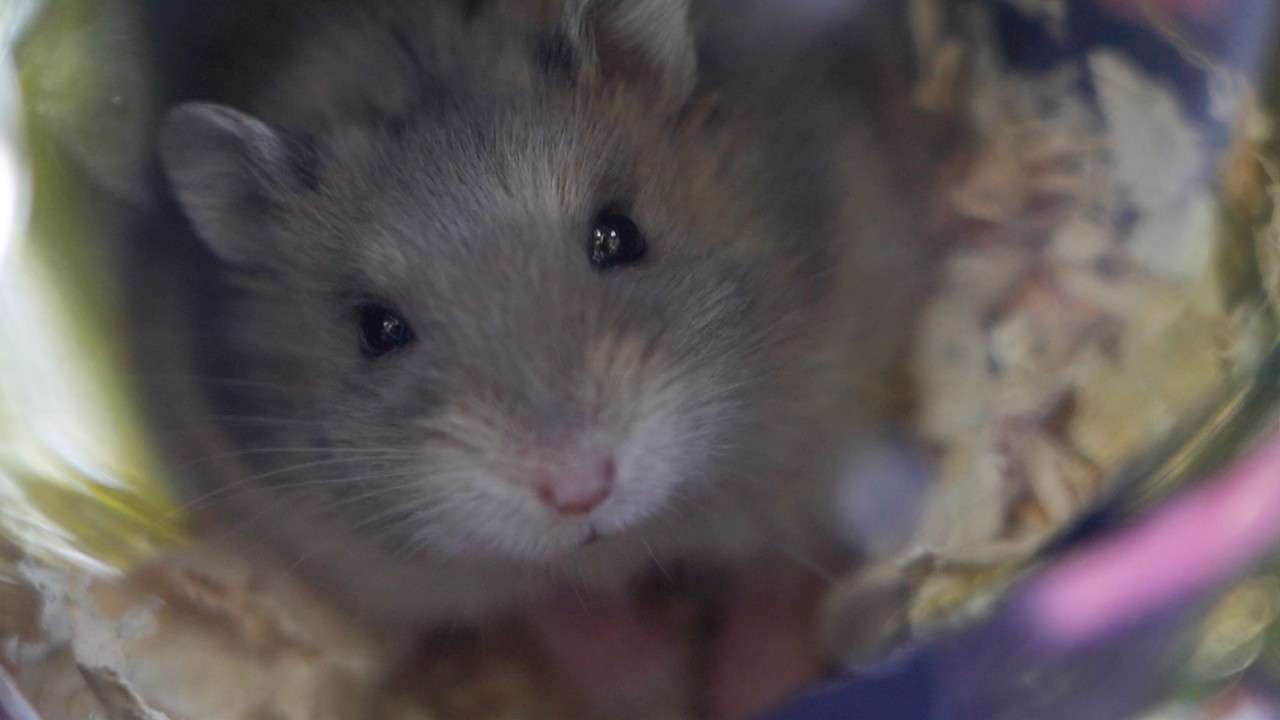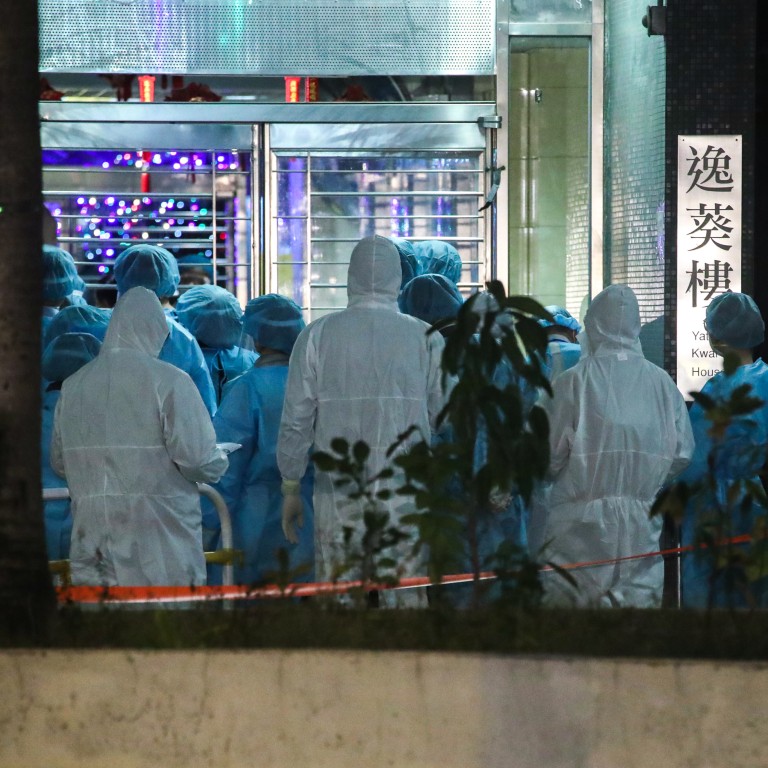
Coronavirus Hong Kong: suspected superspreading event at public housing block triggers 3-day testing order for 2,500 residents
- Residents of Kwai Chung Estate’s Yat Kwai House must undergo daily screening for three days and will only be allowed to leave home after testing negative for virus
- Officials had reported only two confirmed and a number of preliminary cases earlier on Thursday but by midnight 16 people had tested positive, health expert says
Hong Kong authorities have placed a public housing block under a three-day restriction order for more than 2,500 residents to undergo daily Covid-19 testing, after a suspected Omicron superspreader was believed to have infected more than 10 others in the building.
The order, which takes effect on Friday, was issued after top microbiologist Professor Yuen Kwok-yung inspected Kwai Chung Estate’s Yat Kwai House on Thursday night with health officials. The infected husband of a woman who earlier tested positive for the Omicron variant had visited the building to collect items from refuse stations for recycling, and may have passed on the virus to staff or residents resulting in a superspreading event.
Residents must undergo daily screening for three days and will only be allowed to leave home after testing negative for the virus.
“I appeal to all residents here not to run away, or you will easily bring the virus to communities all over Hong Kong,” Yuen said.
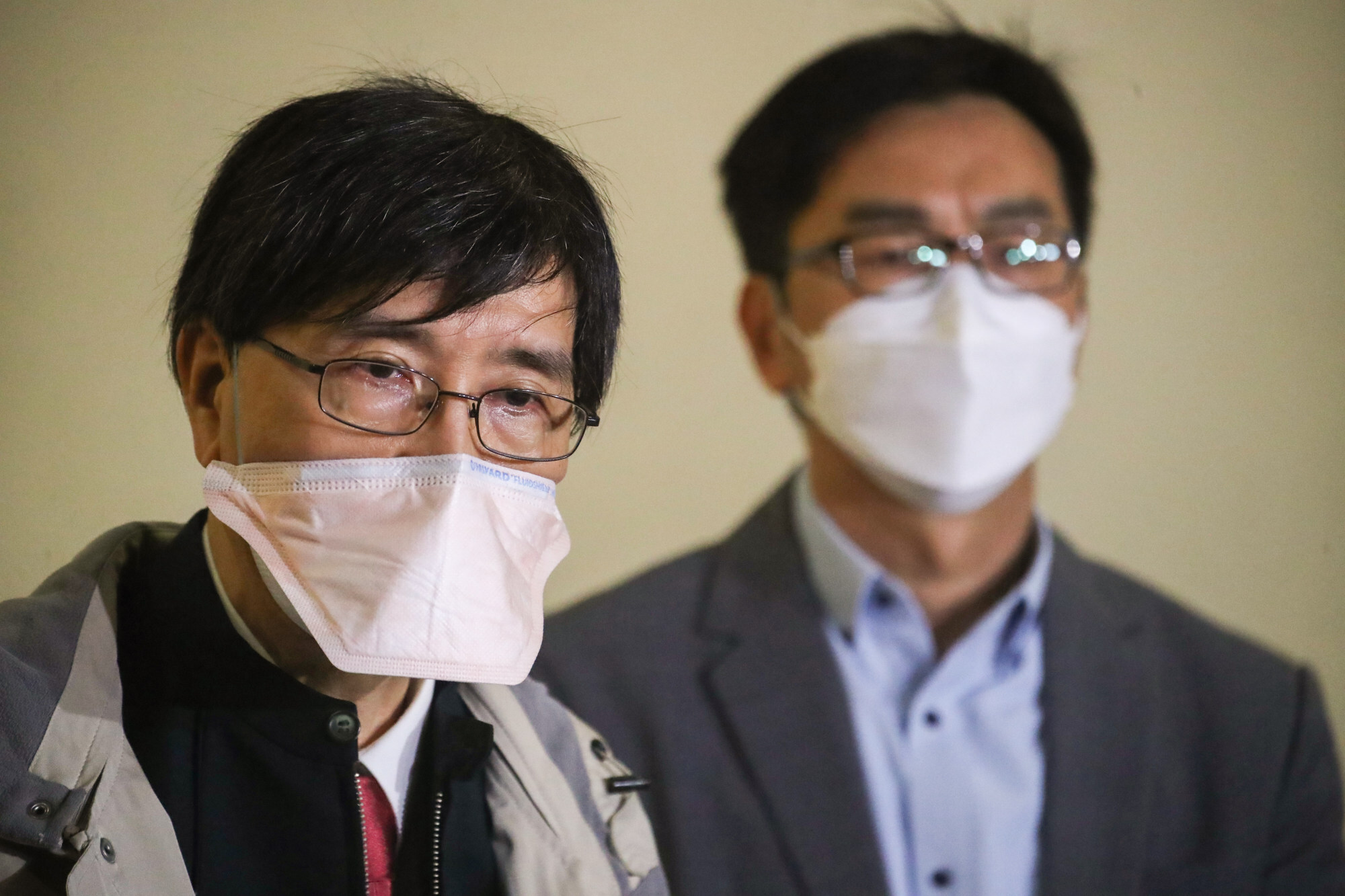
Earlier in the day, health officials, racing to contain a growing wave of cases, ordered residents in about 20 buildings on Hong Kong Island to undergo mandatory testing after discovering the virus in sewage samples.
Education chiefs also announced the cancellation of most in-class lessons next week after more pupils were found to be infected as an Omicron cluster linked to the infected woman spread to several schools.
Yuen said it was decided not to evacuate the residents of Yat Kwai House as no pipes or structural issues were found that could lead to the spread of the coronavirus. But he also conceded that there was not enough space at government quarantine facilities or time to prepare for home isolation.
Officials had reported only two confirmed and a number of preliminary cases at Yat Kwai House earlier on Thursday, but by midnight, Yuen said, 16 people – 15 residents and a security guard – had tested positive, some confirmed with Omicron.
The residents from 12 households live on 11 different floors of the block.
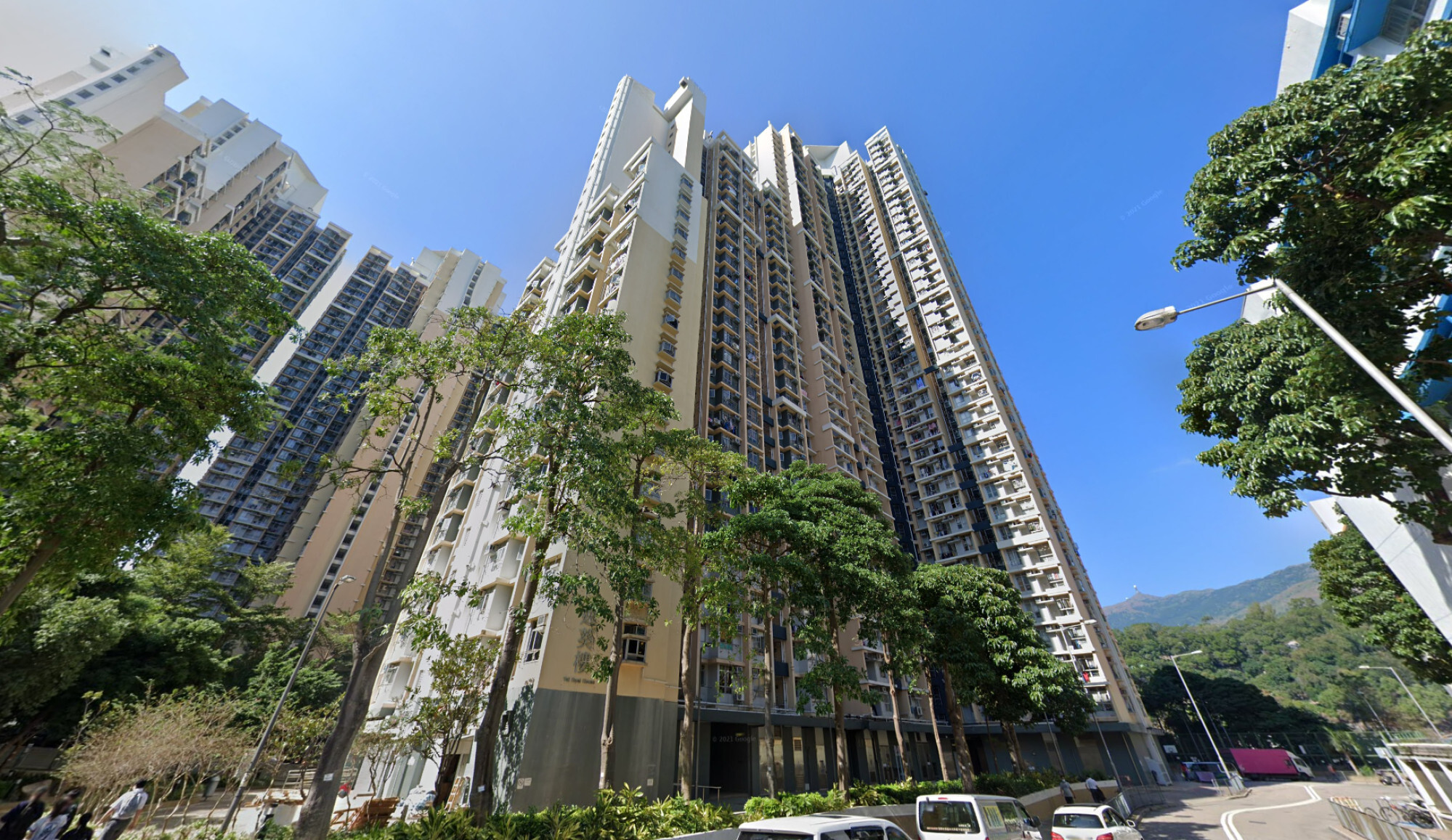
While the husband had also visited refuse stations of the estate’s Luk Kwai House and Chin Kwai House, no confirmed cases had been reported from either block so far. About a dozen cleaners from the three buildings would be sent to a quarantine camp.
Yuen said they believed the family member of the index case – the infected woman, who had recently returned from Pakistan and later tested positive after spending three weeks in a quarantine hotel – could have passed the virus on to estate cleaners and security guards, who in turn infected residents.
The husband also took items he collected from the refuse stations to hawk on Nam Cheong Street. People who visited hawkers there also were urged to go for compulsory testing.
Dr Albert Au Ka-wing of the Centre for Health Protection (CHP) said the suspected superspreader did not disclose his visits to the three buildings until genetic sequencing results showed possible links to the outbreak at Yat Kwai House.
“We need to investigate further to check if he failed to recall or intentionally covered that up,” Au said.
Yuen and Au said they believed the husband had brought the virus to Yat Kwai House on January 13, triggering an outbreak over the following days until January 16.
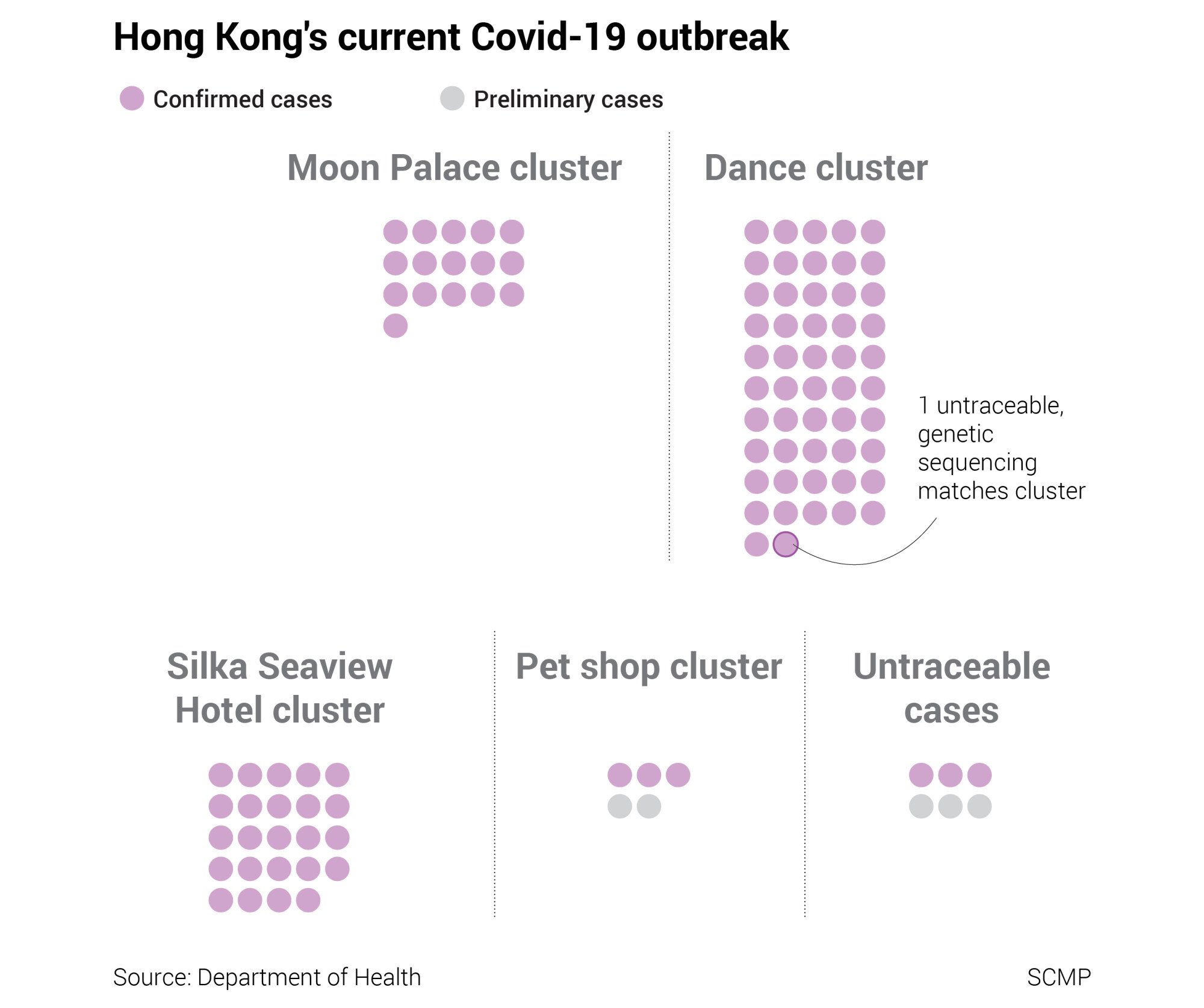
Meanwhile, more pupils at a number of schools were also confirmed as infected on Thursday, prompting the Education Bureau to suspend in-person learning for most students from next week, while a cluster tied to hamsters sold at a pet store expanded to cover sister shops, reinforcing the suspicion that the virus had spread from animals to humans.
“We are very worried that there are silent transmissions in the community,” the CHP’s Dr Chuang Shuk-kwan told a press briefing in the afternoon. “Therefore, we urge residents who have been to pet shops and are worried about the outbreak to undergo testing.”
Health officials announced that sewage samples taken in Aberdeen on southern Hong Kong Island tested positive and residents in about 20 buildings in the area must undergo testing, but no lockdowns were ordered.
The discovery of the Delta variant at the Little Boss pet store in Causeway Bay triggered a cull of about 2,000 hamsters, most of which were imported from the Netherlands. Eleven samples taken from the rodents have tested positive and a sales assistant was found to be infected.
Authorities said one person who visited the store and another who went to its sister store, I Love Rabbit, in Mong Kok were believed to be infected. An environmental sample collected from a hamster cage at a Yuen Long branch of I Love Rabbit also came back positive.
Professor Leo Poon Lit-man, of the University of Hong Kong’s school of public health, said the latest genome analyses found significant similarities between samples taken from hamsters and the saleswoman, suggesting pet-to-human transmission had occurred.
Hong Kong pet owners cry foul over Covid-19 hamster cull
While those samples shared similarities, the saleswoman’s virus had a difference of four genetic mutations from the one that infected two other people – a customer and her husband, authorities said.
“It is possible that [the saleswoman] did not directly transmit the [virus] to the customer,” Chuang explained. “The customer stayed in an environment where there are animals and she has a hamster at home so we don’t know which is the exact source of infection but it is possible animal-to-human transmission did occur.”
Government pandemic advisers have sought to explain the need for the ongoing cull and some have become a target for threats in doing so. The office of Chief Executive Carrie Lam Cheng Yuet-ngor issued a statement condemning the messages.
“The government strongly condemns the irrational attitude adopted towards the anti-epidemic efforts, and worse still, intimidating remarks made against the experts, by a minority of people. It calls on all sectors of society to unite to fight the epidemic,” a spokesman said.
Ten of 14 new cases were local, while the remaining four were imported. The city’s official tally stands at 13,096, with 213 related deaths. About 20 preliminary-positive cases were also reported.
Officials said they were unable to determine the source of four of the latest cases, taking the total number of untraceable infections in the current outbreak to six.
Among them was a student living in Kwun Tong carrying the Delta variant, which had a genetic sequencing different from the virus that infected the Little Boss saleswoman, according to Chuang. She noted the student had no direct contact with animals and had not visited any pet shops recently, suggesting he was likely to have been infected by an unknown human carrier.
Authorities gave new details about an untraceable case that emerged on Wednesday involving a kindergarten teacher who lived in Mei Foo Sun Chuen. She had an encounter with two infected students, tied to a quarantine hotel cluster, which lasted just nine seconds.
Her Octopus card transaction history showed she went through a tunnel at an MTR exit at about the same time as the two students last Friday. A friend who dined with her was among the latest confirmed infections.
“This is the only possible common path we could find at this moment. Of course if there are other instances such as [meal sharing] … that may explain the infection more,” Chuang said.
Hong Kong should roll out more e-vouchers, relax eligibility for aid: IMF
According to the arrangement revealed by the Education Bureau, all secondary schools must suspend in-person learning starting on Monday, but Secondary Six pupils studying for April’s Diploma of Secondary Education exams will still be allowed to go to class, but not for more than half a day.
Students in other grades will not be returning to campus until at least February 7. The arrangements, which went into effect at kindergartens and primary schools earlier this month, also apply to tutoring centres.
The suspension came after the Omicron cluster, believed to have been sparked by cross infection at the Silka Seaview quarantine hotel in Yau Ma Tei, spread to several schools. The woman, who lives in Sham Shui Po, tested positive days after her three-week hotel quarantine had ended, bringing the virus into the community.
The cluster has grown to 24 people, including a teacher and four pupils at Delia Memorial School (Broadway) in Mei Foo.

Authorities also said three students from other schools were confirmed as infected after they visited the home of a pupil who was carrying the virus. All the schools involved – Delia Memorial, HKMA David Li Kwok Po College in Tai Kok Tsui, Buddhist Fat Ho Memorial College in Tai O, and Lantau International School on Lantau Island – had already suspended face-to-face classes.
Respiratory medicine specialist Dr Leung Chi-chiu told a radio programme a “network” of infections could form among schools, families and those who interacted with students socially if in-person classes were not suspended.
He also urged schools to keep online lessons running so pupils would stay at home and not go out for social gatherings.
The bureau last Friday suspended primary schools and kindergartens until after Lunar New Year, but city leader Carrie Lam Cheng Yuet-ngor declined to impose similar measures on secondary schools, saying at the time that older pupils could better manage themselves.
Nam Ching-sze, principal of Methodist Church HK Wesley College, expressed worries that on-campus learning could be suspended indefinitely given the ever-evolving outbreak, damaging students’ mental well-being and learning outcomes.
Halina Poon Suk-han, principal of Christian & Missionary Alliance Sun Kei Secondary School, said all secondary school principals began preparing for the suspension after primary schools and kindergartens were ordered to close down classrooms last week.
“We do not want to suspend classes but we need to accept it,” she said.
She and Lin Chun-pong, chairman of the Hong Kong Association of the Heads of Secondary Schools, welcomed the flexible arrangement for Form Six students.
But Lin said schools were concerned about the impact of the suspension on students’ mental health, which could suffer when they were no longer interacting with their peers in person.
Additional reporting by Victor Ting and Tony Cheung





